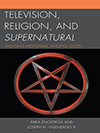- Author(s): Jim Clarke
- When: 2015-03
- Where: Journal of Religion and Popular Culture
In the Doctor Who mythos, resurrection takes two opposing forms, one quasi-messianic and utopian, and one profoundly nihilistic and atheistic. Doctor Who presents opportunities of rebirth which provide a return to previous life or a continuation of existence, usually by way of the temporal or dimensional “erasing” of the fact of death. For the Doctor himself, resurrection by way of regeneration provides a discontinuous life, a resurrection which is neither continuation nor apotheosis. Resurrection in the spin-off series Torchwood, however, is seen to consistently fail, resulting in afterlives that are monstrous, fragile, and unnatural, involving fear and suffering on the part of those who experience not a return from or evasion of the finality of death, but instead experience a living death. For Captain Jack Harkness, resurrection is a strategy of eternal suffering, resulting not in apotheosis but in yearning for perpetually deferred death. In this article, I will suggest that the positivist narratives of Doctor Who propose a utopian existence in which wrongs, including death, can be reversed, thanks to the salvation capacities of the Doctor-Messiah. By contrast, Torchwood suggests a dystopian and nihilist existence in which not only is death inevitable, but salvation through a viable afterlife is impossible, indeed meaningless.








